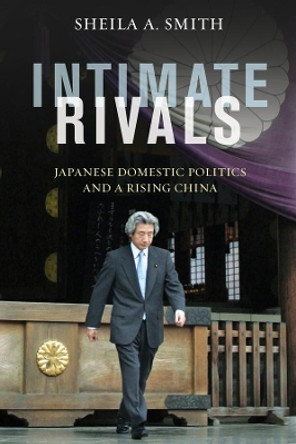Description
"Washington's relationship with Tokyo is generally considered the most important of the United States' 70-odd alliances. In this intimately knowledgeable book, Smith shows how that alliance looks to the Japanese: increasingly unreliable."-Andrew J. Nathan, Foreign Affairs
"Masterfully traces the interplay of Japan's military heritage, politics, national sentiment, threats, and alliance with the United States in the formation and development of the Self-Defense Force. Even experts will find new information and insights."-Admiral Dennis Blair, US Navy (Ret.), former Commander-in-Chief, US Pacific Command
"A must-read for US policymakers responsible for Asia." -J. Thomas Schieffer, former US Ambassador to Japan
"A highly readable and richly detailed account of Japan's rearmament and the politics surrounding it."-Journal of American-East Asian Relations
Japan has one of Asia's most technologically advanced militaries, yet it has struggled to use its hard power as an instrument of national policy. The horrors of World War II continue to haunt policymakers in Tokyo, but a fundamental shift in East Asian geopolitics has forced Japan to rethink its commitment to pacifism. Its military, once feared as a security liability, now appears to be an indispensable asset.
In Japan Rearmed, Sheila Smith argues that Japan is not only responding to threats from North Korean missiles and Chinese maritime activities, it is fundamentally reevaluating its dependence on the United States as its leaders confront the very real possibility that they may soon need to prepare for war.
About the Author
Sheila A. Smith is John E. Merow Senior Fellow for Asia-Pacific Studies at the Council on Foreign Relations and author of Intimate Rivals: Japanese Domestic Politics and a Rising China. She is chair of the US advisors to the US-Japan Conference on Cultural and Educational Interchange and is a frequent media commentator on East Asian affairs.
Reviews
Timely and useful...Japan's armed forces remain limited in size and in the operations that they can conduct, and have never, since 1945, engaged in combat. Nor has the country seriously debated equipping them with nuclear weapons. Now, however, North Korean and Chinese military initiatives, along with uncertain American attitudes toward the alliance with Japan, threaten to change all this. -- Michael Mandelbaum * American Interest *
Washington's relationship with Tokyo is generally considered the most important of the United States' 70-odd alliances. In this intimately knowledgeable book, Smith shows how that alliance looks to the Japanese: increasingly unreliable. -- Andrew J. Nathan * Foreign Affairs *
The must-read book for anyone who seeks foundational knowledge of what is arguably the most important military alliance in the world...A highly readable and richly detailed account of Japan's rearmament and the politics surrounding it...Likely to grow even timelier as tensions in East Asia ratchet up. -- Jason Morgan * Journal of American-East Asian Relations *
A well-written and comprehensive overview of postwar Japan's security evolution...Deserves to be read by policy makers interested in Japanese security and to be added to the syllabi of undergraduate and postgraduate programs on East Asian security and Japanese international relations. -- Giulio Pugliese * Monumenta Nipponica *
Smith masterfully traces the interplay of Japan's military heritage, politics, national sentiment, threats, and alliance with the United States in the formation and development of the Self-Defense Force. Even experts will find new information and insights in her account. As she makes clear, the SDF is a work in progress, and this book provides a welcome guide to its possible future path. -- Admiral Dennis Blair, U.S. Navy (Ret.), former Commander-in-Chief, U.S. Pacific Command
At a time when the East Asian security environment is becoming ever more dangerous and unpredictable, Sheila Smith offers a timely guide to the choices facing Japan. This is an insightful and indispensable look at the evolution of Japan's approach to national security and the consequential decisions it will face in the future. -- James Steinberg, Syracuse University
After fighting a series of aggressive wars in the early twentieth century, Japan retreated from power politics and has remained reluctant to develop a military capability that matches its economic power. Will this change? The paradoxical transition from militarist aggression to pacifism and isolationism has been discussed before, but never with the clarity Sheila Smith displays in this important book. She shows that Japan will have some critical choices to make to maintain its security in the challenging geopolitics of the twenty-first century. -- Kiichi Fujiwara, University of Tokyo
With keen insight and scholarly precision, Smith tells us why the Japanese public's evolving attitude toward the use of military force is important to American security and the peace of northeast Asia. A must-read for U.S. policymakers responsible for Asia. -- J. Thomas Schieffer, former U.S. Ambassador to Japan
Book Information
ISBN 9780674293953
Author Sheila A. Smith
Format Paperback
Page Count 352
Imprint Harvard University Press
Publisher Harvard University Press









